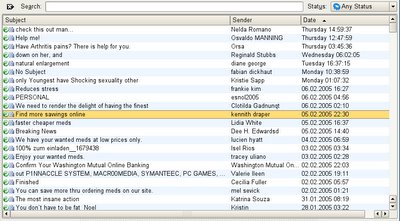Yes, it is official. As I had mentioned in an earlier post, 12daily Pro (12dailypro.com) has been shut down permanently, and the founder of the company, Charis Johnson of Charlotte, N.C., is being charged by the SEC (Securities and Exchange Commission) for fraud.
Both she and her companies, 12daily Pro and LifeClicks, LLC. ("LifeClicks") have ceased any and all solicitation of investors. Further, she agreed to a complete freeze of all assets as well as to the appointment of a receiver (Thomas F. Lennon) who will take control of the companies' operations.
StormPay, which 12daily Pro had used as its payment processor, is still operating of course... but as I understand it, they may still be having a few problems due to the recent overload of website traffic that occurred as a result of the news spreading like wildfire across the Internet.
The Scam's Effects:
So far the 12daily Pro scam has cost hundreds of thousands of people thousands and thousands of dollars. In Utah alone, the number of Utahns that were bilked by the 12daily Pro Internet scam has exceeded 8,400.
For example, Derek Dodge, a mortgage broker from Salt Lake City, said that he and a partner of his had lost $2,300 in 12daily Pro. He added, "We were leery of this for a long time because Utah has always been notorious for scams. And then we finally got in, but apparently at the wrong time to make money."
The Ponzi Scheme:
The SEC has described 12daily Pro as a Ponzi or "Pyramid" scheme, in which early investors receive high returns for their money from the money conned from subsequent investors, rather than from real business revenue.
Regarding 12daily Pro, Utah Consumer Protection Director Francine Giani had this to say: "A pyramid scheme just offers memberships, no products or service, just money." People who got money at the beginning (of 12daily Pro) are fat and happy, but a lot of the people underneath never got their money back."
Prosecutors said that 12daily Pro (12dailypro.com) had promised that in exchange for buying $6 units, up to a maximum of $6,000 worth, investors could expect a return of 144% within 12 days simply for using an application to automatically click on, or autosurf, a dozen Internet advertisements daily.
The SEC complaint filed in the U.S. District Court of Los Angeles alleges Johnson ran a $50 million scam that involved more than 300,000 investors, pulling in close to $2 million for herself.
The SEC stated that Johnson (without actually admitting guilt) had agreed to a tentative settlement in which she promised to stop recruiting any new members. The deal also freezes her assets and requires the government to appoint a receiver who will monitor Johnson's companies and distribute whatever refunds are eventually approved.

How and When it Happened...
In late January, 12daily Pro began to collapse after StormPay decided to halt processing payments for the 12dailypro.com website. StormPay, which is currently under investigation by Tennessee authorities, said it took the action after learning that 12daily Pro had come under suspicion as an illegal scam.
Then in late February things really began to unravel as the U.S. Securities and Exchange Commission stepped in and filed fraud charges. The Commission alleges:
That the defendants defrauded investors by operating 12daily Pro as a Ponzi scheme — using new investor monies to pay the promised returns to existing investors — in violation of federal laws.
The defendants falsely represented that upgraded members’ earnings “are financed not only by incoming member fees, but also with multiple income streams including advertising, and off-site investments.”
In fact, at least 95% of 12daily Pro’s revenues have come from new investments in the form of membership fees from new or existing members. The other “multiple income streams” from advertising revenues or off-site investments touted by the defendants were either negligible or non-existent.
In addition, undisclosed to investors, Johnson transferred more than $1.9 million in investor funds to her personal bank account since mid-2005. StormPay's assets are also apparently targeted by the SEC.
How Can You Avoid Being Taken by a Scam?
Here's what to know...
-From the Federal Bureau of Investigation - Common Fraud Schemes...
What's a Ponzi scheme exactly? A Ponzi scheme is essentially an investment fraud wherein the operator promises high financial returns or dividends that are not available through traditional investments. Instead of investing victims' funds, the operator pays "dividends" to initial investors using the principle amounts "invested" by subsequent investors.
The scheme generally falls apart when the operator flees with all of the proceeds, or when a sufficient number of new investors cannot be found to allow the continued payment of "dividends."
This type of scheme is named after Charles Ponzi of Boston, Massachusetts, who operated an extremely attractive investment scheme in which he guaranteed investors a 50 percent return on their investment in postal coupons. Although he was able to pay his initial investors, the scheme dissolved when he was unable to pay investors who entered the scheme later.
Important Tips to Avoid Ponzi Schemes:
- As with all investments, exercise due diligence in selecting investments and the people with whom you invest.
- Make sure you fully understand the investment BEFORE you invest your money!
What is a Pyramid Scheme?
What's a pyramid scheme exactly? A pyramid scheme is a non-sustainable business model that involves the exchange of money primarily for enrolling other people into the scheme, usually without any product or service being delivered. Pyramid schemes, also referred to as franchise fraud, or chain referral schemes, are marketing and investment frauds in which an individual is offered a distributorship or franchise to market a particular product.
The real profit is earned, NOT by the sale of the product, but by the sale of NEW distributorships. Emphasis on selling franchises rather than the product eventually leads to a point where the supply of potential investors is exhausted and the pyramid collapses, causing everyone to lose all of their money.
At the heart of each pyramid scheme there's typically a representation that new participants can recoup their original investments by inducing two or more prospects to make the same investment. Unfortunately, promoters fail to tell prospective participants that this is mathematically impossible for everyone to do, since some participants drop out, while others recoup their original investments and then drop out.
Important Tips to Avoid Pyramid Schemes:
- Be wary of "opportunities" to invest your money in franchises or investments that require you to bring in subsequent investors to increase your profit or recoup your initial investment.
- Independently verify the legitimacy of any franchise or investment before you invest!

The SEC's Official Litigation Release...
U.S. SECURITIES AND EXCHANGE COMMISSION
Litigation Release No. 19579 / February 27, 2006
SECURITIES AND EXCHANGE COMMISSION v. CHARIS JOHNSON, LIFECLICKS, LLC, and 12DAILY PRO, Civil Action No. CV 06-01018 NM (PLAx) (C.D. Cal.)
SEC HALTS “PAID AUTOSURF” INTERNET PONZI SCHEME THAT RAISED OVER $50 MILLION FROM 300,000 INVESTORS WORLDWIDE
The Securities and Exchange Commission (“Commission”) today announced the filing of securities fraud charges against the operators of www.12dailypro.com, a “paid autosurf program” that in fact was a massive Ponzi scheme which raised more than $50 million from over 300,000 investors worldwide by offering a 44% return on investment in just 12 days. As a result of the Commission’s charges, the defendants, Charis Johnson, age 33, of Charlotte, N.C., and her companies, 12daily Pro and LifeClicks, LLC (“LifeClicks”), ceased their solicitation of investors and agreed to a freeze of all their assets and the appointment of a receiver who will take control of the companies’ operations.
According to the Commission’s complaint, which was filed last week in federal district court in Los Angeles, California, www.12dailypro.com claimed to be a paid autosurf program — a form of online advertising program that purportedly generates advertising revenue by automatically rotating advertised websites into a viewer’s Internet browser. Advertisers purportedly pay “hosts,” which in turn pay their members to view the rotated websites. The Commission’s complaint alleges that 12daily Pro’s sale of membership units constituted the fraudulent and unregistered sale of securities under the federal securities laws.
According to the Commission’s complaint, the 12daily Pro website, recently ranked as the 352nd most heavily trafficked website, solicited investors to become “upgraded members” by buying “units” for a “fee” of $6 per unit, with a maximum of 1,000 units. 12daily Pro promised to pay each upgraded member 12% of his or her membership fee per day for 12 days. At the end of 12 days, the member purportedly would have earned a total of 144% of his or her original membership fee, 44% of which would be profit on the membership fee. To receive the promised payment, a member purportedly must view at least 12 web pages per day during the 12 day period. The amount of returns that 12daily Pro would pay its members, however, was in fact dependent solely on the amount of each member’s investment, not on the amount of website-viewing or any other services rendered.
The Commission alleges that the defendants defrauded investors by operating 12daily Pro as almost a pure Ponzi scheme — using new investor monies to pay the promised returns to existing investors — in violation of the federal securities laws. The defendants falsely represented that upgraded members’ earnings “are financed not only [by] incoming member fees, but also with multiple income streams including advertising, and off-site investments.” In fact, at least 95% of 12daily Pro’s revenues have come from new investments in the form of membership fees from new or existing members. The other “multiple income streams” from advertising revenues or off-site investments touted by the defendants were either negligible or non-existent. In addition, undisclosed to investors, Johnson transferred more than $1.9 million in investor funds to her personal bank account since mid-2005.
Johnson and her companies have consented to the entry of a court order that permanently enjoins them from future violations of the antifraud provisions of the federal securities laws, imposes a freeze on their assets, prohibits the destruction of documents, and appoints Thomas F. Lennon as permanent receiver over the assets of 12daily Pro and LifeClicks, LLC. The order is subject to approval by United States District Judge Nora M. Manella. Johnson and her companies consented to the order without admitting or denying the allegations in the complaint. The Commission’s complaint also seeks repayment of ill-gotten gains and civil money penalties; the amounts to be sought will be determined at a later date.
The Commission’s complaint alleges that the defendants violated the antifraud provisions of Section 17(a) of the Securities Act of 1933 and Section 10(b) of the Securities Exchange Act of 1934 and Rule 10b-5 thereunder, and the securities registration provisions of Sections 5(a) and 5(c) of the Securities Act.
This matter was referred to the Commission in early February by several members of the public. Complaints and tips from the public are vital to the Commission’s mission to protect investors, and the Commission staff reviews each and every complaint it receives.











